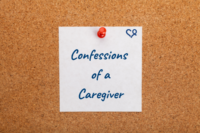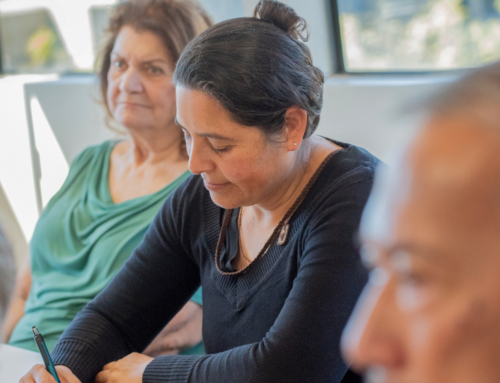 One of the hallmark education programs at Alzheimer’s San Diego is our “Confessions of a Caregiver” series. We regularly bring together a panel of current and former care partners for an honest discussion about the challenges of caring for someone living with dementia. Recent programs have focused on themes of relationships and intimacy, and women’s perspectives.
One of the hallmark education programs at Alzheimer’s San Diego is our “Confessions of a Caregiver” series. We regularly bring together a panel of current and former care partners for an honest discussion about the challenges of caring for someone living with dementia. Recent programs have focused on themes of relationships and intimacy, and women’s perspectives.
The next installment of this series will be held on Wednesday, December 15th and will focus on the perspectives of men who care for someone with dementia, but all care partners are welcome to attend. Click here to learn more and register >>
We often focus on the impact dementia has on women, as we know they are disproportionately affected. Two-thirds of all Americans living with dementia are women, and they also comprise more than 60% of caregivers. While caregivers who identify as male are in the minority, they do face many unique challenges, whether they are caring for a parent, spouse, sibling, or even a child. Over time, we have put together some helpful resources for men on their caregiving journey, such as a support group for male care partners.
Another useful tool we utilize is Coach Broyles’ Playbook for Alzheimer’s Caregivers. This was written by a former college football coach, who wanted to put together a “playbook” as a way to help caregivers. Coach Broyles wrote this specifically with men from the Baby Boomer era in mind, who often focused on their careers outside of the home while the women in their lives managed things like household chores and the kids. As men lose a life partner to the disease, they may have to learn basic skills they weren’t used to such as cleaning, clothes shopping, and preparing meals.
Many same-sex couples from this generation do not have children, so often a partner becomes the primary caregiver. In their past, the couple may have been alienated or even completely disowned by their families for being gay. While they can establish a new life with their partner, there can be deep feelings of a lack of support if their partner develops dementia.
The emotional labor combined with the new responsibilities for any male caregiver can be overwhelming. A common complaint they may hear from their person is: You do nothing for me. This can feel like a personal attack, but it’s important to remember it’s the disease talking, not your person.
As Coach Broyles explains: “Middle Stage AD (Alzheimer’s disease) is when you, the caregiver, have to make the biggest changes. The one you are caring for can’t change so it is up to you. This is the time that can make or break you. Every change you make to your home life is likely to make you feel a little sad. You already did a lot to make the home safe for them in Early Stage AD. Now it is time to do more. In Middle Stage AD, they are more easily upset and confused. Some of their confusion may be caused by the damage in their brain that changes how they “see” things. While there is nothing wrong with their eyes, they are losing the ability to figure out what the images they see really mean.”
LEARN MORE | Explore our Tip Sheet Library
When it comes to personal care, male caregivers may also face some challenges with unfamiliar tasks. This is usually a learning curve when it comes to things like combing/styling her hair, putting on makeup, getting dressed, and more. But Coach Broyles reminds care partners to focus on the many ways they can succeed at caregiving:
“You know more about the person you are caring for than anyone else in the world. Use what you know to make a daily plan of care and activities. People with dementia do better if there is a plan for each day. To make this plan work, you need to think about these things:
- What time of day do [they] eat breakfast, lunch, and dinner?
- What are [their] favorite foods?
- What are [their] least favorite foods?
- Did [they] snack during the day?
- Did [they] drink alcohol in the evenings?
- Did [they] take a shower or a bath?
- What time of day did [they] bathe or shower? How many times a week?
- What time did [they] get up in the morning and go to bed at night?
- Did [they] take naps?
- What style of clothes did they wear? Dresses, pants, a uniform?
- Did [they] have favorite TV shows she always watched?
- Did [they] have hobbies?
- What were [their] favorite things to talk about?”
RELATED | Do’s and Don’ts of communication and dementia
Coach Broyles also acknowledges that men typically want to be a “provider”, so it can be devastating when they aren’t able to handle all the needs required for 24-hour care, or perhaps pay for the type of care their person may need. Intimacy is also a new challenge. Intellectually, physically, and sexually, their person may not be providing the same level of attention towards them, which can lead to feelings of inadequacy and loneliness. He writes:
“You may have seen that they do not talk like they used to. They are having more trouble finding words. Their sentences are short and choppy. The loudness of their voice may have changed. Their words may not make any sense. This is called “word salad.” As you listen, you know they are trying hard to tell you what they want. The words just come out wrong. You may find as time passes that they will not be able to start a talk with you. They may not ask many questions either. They may sit or walk around the room and say nothing unless you begin talking to them first.
- Do take a deep breath.
- Don’t argue with them. It is easier to agree with them and then do what you had planned anyway.
- Don’t try to reason with them. They will just get angry and they won’t know why. Change what you’re talking about to something they like.
- Don’t correct or fuss at them for getting something wrong. Does it really matter? It will only make them feel bad.”
If you’re interested in learning more, register for the upcoming Confessions of Caregiver class on Wednesday, December 15th or contact Sarina Barker at
At Alzheimer’s San Diego, we know all care partners face unique challenges – and we’re here to make sure you have the tools you need to succeed. Get in touch with one of our Clinical Care Coaches by calling





